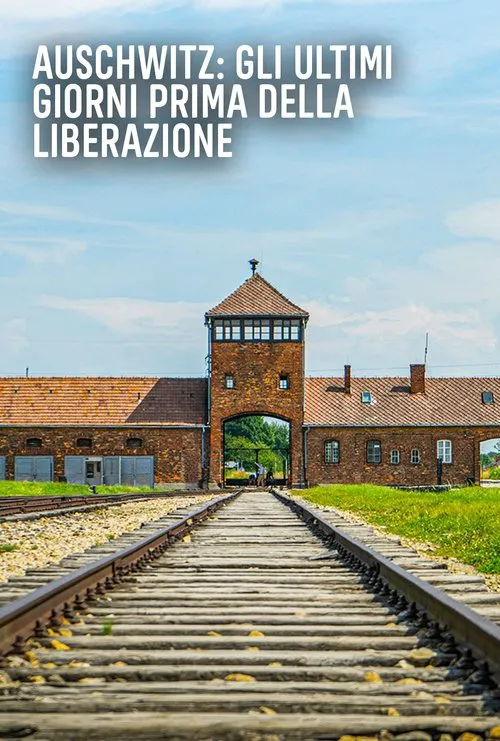Auschwitz: Countdown to Liberation

Plot
Auschwitz: Countdown to Liberation is a documentary that delves into the lives of survivors who experienced the unimaginable horror and suffering within the Nazi concentration camp during World War II. The film, through the personal testimonies of Eva Kor and Samuel Modiano, along with other survivors, brings to light the courageous stories of resistance and resilience that defined the lives of those confined to this notorious camp. The documentary begins with an introduction to the camp's inhumane conditions, laying the foundation for the understanding of the unimaginable suffering that unfolded within its walls. Established in 1940, Auschwitz would grow to become one of the most notorious Nazi concentration camps, responsible for the deaths of over one million people. The camp's conditions were nothing short of cruel, with prisoners subjected to forced labor, starvation, and disease. It was here that human experimentation and systematic extermination reached its darkest heights. Eva Kor's story serves as a powerful example of the human spirit's capacity for resilience in the face of unimaginable adversity. Eva, a survivor of the 'twin twins' selections at Auschwitz, where hundreds of twins were subjected to inhumane medical experiments, recounts her experiences with remarkable clarity. Born in 1934, Eva's story begins with her and her twin sister, Miriam, being forcibly separated from their family at the Kovno Ghetto in Lithuania. Eva recounts how upon their arrival at Auschwitz, she and her sister were identified as twins due to their 'valuable genetics', and thus spared immediate execution. However, their fate was intertwined, as they became subjects in Dr. Josef Mengele's experiments, designed to test the effect of hypothermia and other medical conditions on humans. The experiments were dehumanizing, inhumane, and torturous, and the effects lingered long after their liberation. Her story highlights the complexity of human emotions during the war. Eva has since become an advocate for the victims, working tirelessly to educate people about the atrocities committed at Auschwitz and other concentration camps. Her advocacy work extends beyond simply sharing her own experiences; it also encompasses raising awareness about the importance of forgiveness and the healing power of reconciliation. By confronting the past, Eva hopes to break free from the shackles of bitterness that often bind survivors to their traumatic experiences. Samuel Modiano's experiences at Auschwitz paint a similar picture of resilience and defiance. Samuel, an Algerian-born Jewish Frenchman, recounts how his family was rounded up and imprisoned at Fort of Nice during the Vichy regime before being transported to Auschwitz. The brutal conditions and dehumanizing treatment Samuel endured at the camp could have easily crushed his will to survive. However, his innate resilience, along with that of the other prisoners, fueled his determination to hold onto hope amidst unrelenting suffering. One such story involves a friend, Michel, who had the extraordinary ability to tell the most complex mathematical formulas simply by hearing the sound of shovels hitting the ground beneath his feet at work. Despite the constant noise at work, Michel's mind, though tired and worn out, allowed him to solve equations within mere seconds, a testament to the strength that still lingered in their hearts during such an inhumane period. Samuel's and Eva's stories, along with those of others featured in the documentary, serve as powerful testaments to the indomitable human spirit. Their experiences humanize the survivors and underscore the importance of their stories in our collective memory, ensuring that the horrors they endured never again repeat themselves. Throughout the film, the survivors express a sense of pride in their resistance against the Nazi regime, in spite of facing unimaginable horrors. Their determination serves as a powerful reminder that even in the darkest moments, there exists a glimmer of hope, which is nurtured by courage, solidarity, and resilience. Auschwitz: Countdown to Liberation serves as a poignant reminder of the importance of our own memories, our ability to learn from the past, and the significance of honoring those who endured unimaginable suffering in the fight for human freedom. By sharing these touching stories, the documentary reminds us that even the most heinous atrocities are tempered by acts of compassion, selflessness, and the strength that only human connections can provide. As the documentary unfolds, it raises an essential question – what does liberation mean to someone who has endured the horrors of Auschwitz? The answer is profound. Liberation is not merely the end of suffering, but also the chance to forge a new life filled with hope and freedom. This is something that Eva, Samuel, and other survivors experienced not only at the hands of the Nazis' liberation, but also internally, in their unyielding fight against despair. In a broader sense, the documentary highlights the significance of freedom – not just the end of the war but a fundamental condition of being human. The film emphasizes that the value we place on freedom lies in our collective memory, where memories of the Holocaust serve as a reminder of what we must strive to prevent recurring. Ultimately, the stories told in Auschwitz: Countdown to Liberation are an unyielding tribute to the survivors and the countless victims who perished within these walls. These recollections of suffering and defiance are crucial reminders of the value of our humanity and the enduring power of hope, even in the darkest of times.
Reviews
Recommendations


